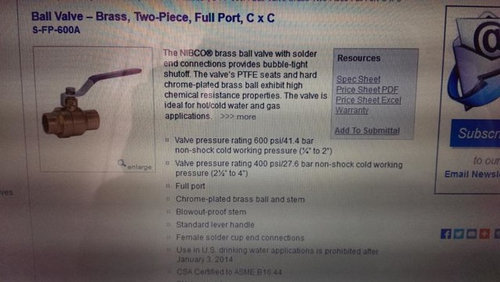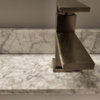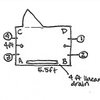Nibco Shutoff Valve Prohibited on Potable Water
ohmmm_gw
9 years ago
Related Stories

SAVING WATERXeriscape Gardens: How to Get a Beautiful Landscape With Less Water
Conserve water and make gardening much easier with the xeriscape approach’s 7 principles
Full Story
GREAT HOME PROJECTSHow to Add a Solar Water Heater
Lower energy bills without a major renovation by putting the sun to work heating your home’s water
Full Story
LIFEThe Top 5 Ways to Save Water at Home
Get on the fast track to preserving a valuable resource and saving money too with these smart, effective strategies
Full Story
EARTH DAYGrow a Beautiful Garden With Ecofriendly Greywater
Reducing home water waste means lower bills and a healthier planet. Here's how to set up a greywater home irrigation system that can help
Full Story
SAVING WATER6 Reasons Why You Should Save Your Rainwater Now
Collect and store during the rainy season so you’ll have water ready for irrigation when you need it
Full Story
KITCHEN DESIGN8 Kitchen Design Tips for Foodies
If you own at least one pricey knife and have a slew of kitchen tools, you’ll want to read this
Full StoryMore Discussions











ohmmm_gwOriginal Author
hippy
Related Professionals
Worcester Plumbers · Livingston Handyman · Citrus Park Kitchen & Bathroom Remodelers · Centerville Kitchen & Bathroom Remodelers · Creve Coeur Kitchen & Bathroom Remodelers · Emeryville Kitchen & Bathroom Remodelers · Lynn Haven Kitchen & Bathroom Remodelers · New Port Richey East Kitchen & Bathroom Remodelers · Red Bank Kitchen & Bathroom Remodelers · South Lake Tahoe Kitchen & Bathroom Remodelers · Toledo Kitchen & Bathroom Remodelers · Toms River Kitchen & Bathroom Remodelers · Vashon Kitchen & Bathroom Remodelers · Fairmont Kitchen & Bathroom Remodelers · Forest Hills Kitchen & Bathroom Remodelersrandy427
jakethewonderdog
xedos
weedmeister